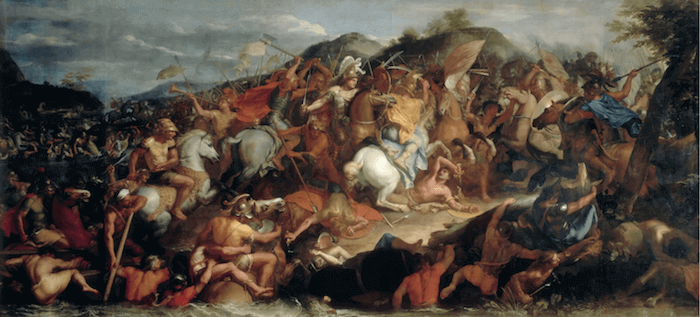People > Memnon
Memnon
Background
Memnon is probably one of the most important and unknown figures in all of history. He was a general within the ancient Achaemenid Empire who had the single and unpopular opinion of retreating before Alexander III the Great's conquest and waging a war of attrition in order to force Alexander's army to retreat before it even got started.
Memnon was in fact correct, if the Persian Empire had pulled all of the resources out of Asia Minor, destroying crops and taking anything of value the invaders could use Alexander would have been forced to turn back long before he reached the heart of the Persian Empire.
Alexander's Macedonian army was well equipped and invincible in battle but he was going to attempt the conquest without any money or supplies. If he did try to invade Asia Minor the combined might of the Persian military would have been able to crush a hungry and weakened fighting force.
However, the Persian Empire thought of Alexander as a child and refused to submit anything to him, glancing over the fact he conquered all of Greece, a feat they themselves had been unable to do for hundreds of years.
The Persians at this point were reduced to pomp and ceremony and that would prove their downfall against the battle hungry Greeks who were ready to finally subdue and end their longtime foe the Persians.
Battle of the Granicus
Memnon's opinion was shot down and he was ordered to assemble his army on the banks of the Granicus River which formed a natural boundary into Asia Minor within the rocky terrain. If Alexander was going to cross into Asia Minor he had to do it at the River Granicus.
In what later became known as the Battle of the Granicus, Alexander with his cavalry and infantry stormed across the river and pushed back the Persians, forcing Memnon and his forces to scatter into the country side.

Le Passage du Granique - Charles Le Brun (1665)
This battle would allow Alexander to walk through Asia Minor virtually unimpeded, claiming all of the territory along the way. So in fact, by losing this battle Alexander was able to liberate the Greek and other civilization cities that were relived to be free of Persian rule.
These people would often join in his army and probably treated him and his soldiers like the king he was. This conquest of Asia would force Darius III that Alexander was no idle threat and that the next showdown he would personally command the armies.
In following with the motif of hubris the pompous Darius III brought more pomp and circumstance to the Battle of Issus than actual fighters and would be forced to flee into the countryside in his chariot abandoning his mother, wife and family in the process.
Alexander later pardoned and freed them while restoring their positions within his new empire but that just attests to his character and the lack of such to Darius. He would reassemble his army and try to stop Alexander once more during the Battle of Guagamela but this would end with him fleeing once again. He was not long for the world with his cowardice and was soon betrayed by his own people which led to the entire collapse of the Persian Empire.
Proved Right
Sources
Warning: include(/home/humanityhistory/public_html/addons/domains/alexander-the-great.org/links/people-links.php): failed to open stream: No such file or directory in /home/humanityhistory/public_html/addons/domains/alexander-the-great.org/people/memnon.php on line 49
Warning: include(): Failed opening '/home/humanityhistory/public_html/addons/domains/alexander-the-great.org/links/people-links.php' for inclusion (include_path='.:/opt/cpanel/ea-php73/root/usr/share/pear') in /home/humanityhistory/public_html/addons/domains/alexander-the-great.org/people/memnon.php on line 49